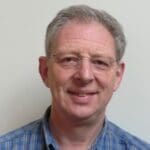
Research interests
Since 1983 Nick Kingsbury has carried out research and has supervised 38 PhDstudents in the following subject areas:
- Speech compression (using multi-pulse and code-excited linear prediction models);
- Error resilient vector quantisation techniques for speech compression;
- Combined coding and modulation for FM data transmission;
- Optimal data demodulation methods for channels with phase jitter;
- Image and video sequence compression using sub-band filter banks, lapped transforms, wavelets and lattice vector quantisation;
- Error resilient techniques for image and video compression, to provide graceful degradation over noisy channels and avoid the need for error correction coding where possible;
- Human visual system models for measuring visibility of coding artefacts;
- Motion estimation techniques using complex lapped transforms and wavelets;
- Motion estimation methods which correctly model occlusion and relative motion of multiple objects;
- 3-D object data acquisition methods for application to face recognition;
- Complex Wavelet Transform techniques;
- Applications of complex wavelets to denoising, texture analysis / synthesis, image classification and segmentation, and compression;
- Robust watermarking of images and video in the complex wavelet domain;
- Denoising and segmentation of 3-D datasets using complex wavelets;
- Seismic image reconstruction;
- Content-based image retrieval;
- Magnetic resonance and ultrasound image enhancement and visualisation;
- Registration of non-rigid objects in images and 3D data;
- Robust keypoint detection and local feature descriptors for object recognition;
- Sparse signal processing methods employing overcomplete wavelet decompositions;
- Machine learning for image and video understanding systems with wavelet-based enhancements.
In 1987 he was awarded the Marconi Premium by the IEE for work on error-resilient speech compression, and in 1992 and 1993 two of his students were given the Best Student Paper award by the SPIE at the Visual Communication and Image Processing Conferences, Boston, for papers on Motion Estimation using Lapped Transforms and on Human Visual Sensitivity to Image Distortions.
A central theme of the above work has been to develop efficient source compression methods which are inherently resilient to transmission errors. Commercial products from this work have been developed by Marconi and Cambridge Neurodynamics/Racal. More recently he has been concentrating on wavelets and their applications in image and multi-dimensional signal processing. A significant central pillar of this work since 1997 has been the development of the Dual-Tree Complex Wavelet Transform (DT-CWT).
Teaching activities
Lecture courses given:
- 3rd year selective course on Digital Filters – 1983 to 1985.
- 6 lectures of M.Phil. course on Maths for Signal Processing – 1985.
- 3rd year course on Modulation / Demodulation – 1986 to 2001.
- 2nd year course on Communications – 1987 to 1997.
- M.Phil. course on Speech Analysis – 1987 to 1990.
- 4th year course on Digital Communications – 1995 to 2002.
- 4th year course on Image Coding – 1996 to 2017.
- 3rd year course on Random Processes – 2002 to 2012.
- 3rd year course on Information Theory – 2007 to 2012.
- 3rd year course on Digital Communications – 2002 to 2017.
- 2nd year course on Image Processing and Photo Editing – 2006 to 2015.
Role and responsibilities
Nick Kingsbury received an honours degree in 1970 and a PhD. degree in 1974, both in Electrical Engineering, from the University of Cambridge, UK. From 1973 to 1983 he was a Design Engineer and subsequently a Group Leader with Marconi Space and Defence Systems, Portsmouth, specialising in digital signal processing and coding, as applied to speech coders,spread spectrum satellite communications, and advanced frequency hopping radio systems.
In 1983 he became a Teaching Fellow and Director of Studies in Information Engineering at Trinity College Cambridge, and from 1986 a University Lecturer in Signal Processing at the University of Cambridge. In October 2000 he was appointed to a Readership in the Department of Engineering at Cambridge and in October 2007 he became Professor of Signal Processing. He is a Fellow of the IEEE and was head of the Signal Processing and Communications Research Group from 2006 until 2016. In Oct 2017 he retired from departmental teaching and administration.
It is with great sadness that we report that Professor Nick Kingsbury died on 11 October 2023.

